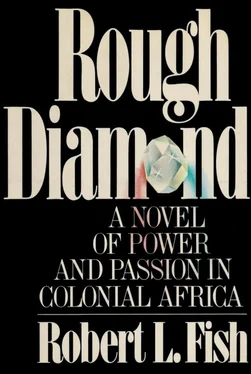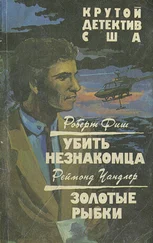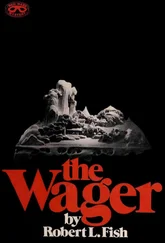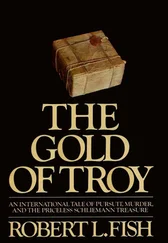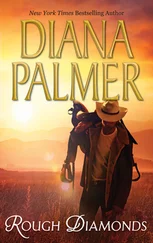Robert L. Fish
Rough Diamond
This book is dedicated with deep affection to:
Diana Barnato Walker
and
Hugh Fraser
Book I: Diamonds!
Kimberley
The two boys were ten and twelve years old, their names were Piet and Erasmus Jacobs, and they were bored. They sat on the steps leading to the rear stoep of the main house on their father’s farm in Griqualand in southern Africa, and considered various means by which they might relieve that boredom. There was always the balance of their chores, of course, tasks that never seemed to end, but the majority of their assigned work had been attended to and the others, they felt, could wait, at least until a little entertainment had been indulged in.
“I’ll race you to the barn!”
“I’m too tired. Besides, you always win. Anyways, it’s too nice a day.”
It was a nice day, indeed; a warm pleasant autumn day with the cackle of hens from the yard, the grunt of the varks wallowing in the mud of their sty, the smell of fresh hay in the air and the mealies drying in the crib, the sight of cattle grazing peacefully in the distance, and, far off the kopjes, the rounded hills, bordering the river.
“What’s a nice day got to do with it?” Younger brothers! “All right; I’ll wrestle you.”
“You’re too big.”
A deep sigh. “All right. What do you want to do?”
“I don’t know… How about a game of five stones?”
A solution, at least. “Good enough. Let’s find some decent stones for a change.”
They looked, finding many, discarding most. A stone for the game of vyf klip had to be just right. “Hoy!” It was Erasmus. “Here’s a beauty! It almost looks like glass, doesn’t it?”
“Yes,” Piet said, doubtful as always, “but it could break and one of us’d get cut—”
“It won’t break! It’s hard as rock! It’ll do fine. D’you have enough? Who goes first?”
But there was to be no first, or second, either. Their mother, coming out onto the stoep , raised her voice in a tone they both recognized. “Erasmus! Piet! Are your chores done?”
“Mostly, Ma.”
“There is no such thing as mostly! Mostly! Things are either done or they’re not done! Now, come into the house, both of you. I need one of you at the churn, and the other one—”
“Aw, Ma—”
“And no arguing! Come along, now.”
An apologetic shrug, one to the other, as if to explain what never had to be explained on a Boer farm, that work came before all else, that work never ended. And that night after the boys had gone to bed, their mother, fishing in the bulging pocket of Erasmus’ trousers before putting them in the wash, pulled out the glasslike stone.
“That boy! He’d put an ox in his pocket, horns and all, if he thought it would fit!” And with a sigh the stone went up on the mantelpiece. Until later that evening when a friendly commercial traveler dropped by to exchange news and share a schnapps or two and a pipe of tobacco, and he happened to notice the stone on the mantelpiece. He picked it up and studied it.
“Rather a pretty thing, this. Where did you get it?”
“I’ve no idea,” Jacobs said, puffing away, not knowing what the man was talking about.
“Oh, it’s just a stone Erasmus found,” said Mevrou Jacobs, not pausing in her mending as she spoke. “He had it in his pocket.” She shook her head. “That boy! You’d think trousers grew on trees, the little care he gives his!”
“Still, it’s rather a pretty thing…”
“If you care for it, take it.”
“I don’t mind if I do,” said the traveler, pocketing the stone; and the conversation turned to more practical matters: the ridiculous rising of prices for almost everything, wherein the traveler was in complete sympathy with the Jacobses and others of his customers; the dearth of rain and the consequent lack of forage; the recent raids of some Mashona tribesmen on the border farms north of Pretoria in the neighboring Transvaal; an outbreak of rinderpest on some farms not far from Bloemfontein in the Orange Free State — all bits of gossip carried by the handelaars as they made their rounds from farm to farm, and often as valuable as the goods they carried in their ox wagons to the news-starved farmers.
And the traveler, the next time he was in Grahamstown to replenish his wares, out of curiosity happened to show the glasslike stone to an expert, and the expert checked the stone for hardness, and then with a frown went further and checked it for specific gravity. When he was done he looked up.
“My friend,” he said quietly, “what you have here, without a question, is a diamond…”
But of course the stone might have come from anywhere. It might well have been dropped by an ostrich, since they were birds that were attracted to anything that glittered, and since they ranged far and wide in Africa. Or the stone might even have been planted by some owner of huge properties, not knowing its true value, in the vain hope that somehow word of the discovery might enhance land values in Griqualand, and bring customers to whom he might unload his worthless land at a proper profit.
Until the day, almost a year later, when a Hottentot shepherd, tending his flocks not far from where Erasmus Jacobs had found his pretty glasslike klip , found another shining stone and was amazed to eventually be offered five hundred sheep, ten oxen, and a horse for his discovery, a price he was quick to accept. And when the stone finally found its way to London and eventually was cut to become the famous Star of Africa, the word was soon out.
There were diamonds lying about on the ground just waiting to be picked up in southern Africa!
From the railing of the combination steam and sailing ship Anglian , anchored in the roadstead of Table Bay in Cape Town after its record run from its dock in the Thames in London, the sight was truly incredible. Young Barney Isaacs, hanging over the rail and trying to realize that he was indeed here in South Africa, had never seen or even imagined anything like it. Short months before he would have sworn he never would see anything like it in his life. The early summer sun was already heating the morning air and under its growing strength the wide harbor shimmered. Ships from all nations dotted the large bay, come to discharge sheets of corregated iron from Birmingham, machinery from Liverpool, cloth from Leeds, tin plate from Spain, casks and bales, cases and crates, all the welter of wares that make up the lifeblood of commerce — and also to offload adventurers intent upon reaching the diamond fields along the Orange and the Vaal Rivers, come, like Barney Isaacs, to make their fortunes.
The lighters that streamed back and forth across the bay, moving goods and men from the anchored ships to the crowded docks, made the normally placid waters choppy; the bright sun winked back at the young boy on the Anglian , reflected from the ruffled waters. To Barney Isaacs the scene looked and sounded like a court regatta he had once seen on the lower Thames staged for the amusement of the Queen, only here the activity was on a truly grand and confused scale. And when he raised his eyes from the bustle and stir in the bay — the shouting of the lightermen as they narrowly avoided one another, the creak of sail, the scream of steam whistles, the grating rattle of anchors being raised or dropped on one ship or another, the rasp of steam-driven winches — when he looked up from these, there was the calm spectacle of Table Mountain rising abruptly from the land, aloof from the tumult beneath it, satisfied to protect the city with its walled strength.
Читать дальше
